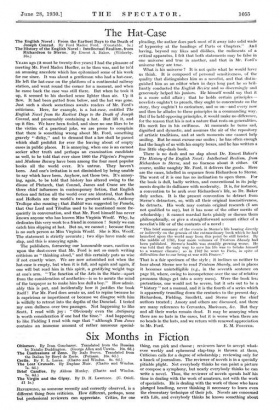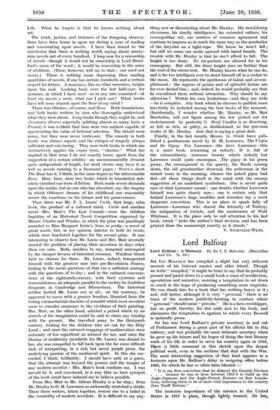Six Month s in Fiction
• The Confessions of Zeno. By Italo Svevo. Translated from The Lost Crusade. By Daphne Muir. (Chatto and Windus.
7s. 6d.)
REVIEWING, as someone recently and correctly observed, is a different thing from criticism. How different, perhaps, none but 'professional reviewers can appreciate. Critics, for one thing, can pick and choose ; reviewers have to accept what- ever weekly and ephemeral clap-trap is thrown at them. Criticism calls for a degree of scholarship ; reviewing only for a knack of journalism. The reviewer of novels is in a specially pitiable plight. Not everybody thinks he can paint a picture or compose a symphony, but nearly everybody thinks he can write a novel. Thus, the reviewer of novels spends half his time in dealing with the work of amateurs, not with the work of specialists. He is dealing with the work of those who have plunged headlong, never thinking it necessary to learn even the elementary technique of their job. Novels are concerned with Life, and everybody thinks he knows something about
Life. What he forgets is that he knows nothing about vat.
The truth, justice, and triteness of the foregoing observa- tions have been borne in upon me during a year of reading and commenting upon novels. I have been forced to the conclusion that there is nothing worth saying about ninety- nine novels out of every hundred. I long now for a censorship of novels—though it would not be censorship in Lord Brent- ford's sense of the word ; it would be censorship in the sense of abolition. (Time, however, will see to that ; one need not worry.) There is _nothing more depressing than reading quantities of novels, if one has certain standards and a certain respect for letters. A weariness, like no other weariness, weighs upon the soul. Looking back over the last half-year, for instance, in which I have read—or at any rate examined—at least six novels a week, what can I pick out? What books have left some deposit upon the floor of my mind ?
There was Oblomov, of course, and Zeno. Both translations, and both books written by men who thoroughly understood what they were about. Long books though they might be, and discursive (Svevo especially splitting almost as many hairs a Proust) it was evident that here were two authors capable of appreciating the value of fictional selection. The details were many, but they were never irrelevant. The comedy in both books was always superb, and the whisper of tragedy always sufficient and convincing. They were both books to which one instinctively applies the vague term, "classics." What lies implied in that term I do not exactly know, apart from the suggestion of a certain solidity—an tmcommunicable element quite independent of length, for short stories may have it as well as novels running to a thousand pages : Svevo's short The Hoax has it, I think, in the same degree as the interminable Zeno. Here, then, were two books which in translation defi- nitely enriched our store of fiction. Both made severe demands upon the reader, but no one who has absorbed, say, the chapter in which Oblomov dreams of his childhood can reasonably resent the exactions on his leisure and his perseverance.
Then there was Mr. F. L. Lucas' Cecile, that large, calm book, the product of a cultured mind. Cecile and. another novel—Mrs. Muir's The Lost Crusade—were the children begotten of an Historical Novel Competition organized by Messrs. Chatto and Windus, in which the prize was puzzlingly awarded to Miss Margaret Irwin's None so pretty—a novel of great merit, but, in my opinion, inferior to both its rivals, which were bracketed together for the second prize. It was interesting to observe how Mr. Lucas and Mrs. Muir severally treated the problem of placing their invention in days other than our own. Both, needless to say, remained untempted by the cheaper devices of historical romance. Wardour Street held no charms for them. Mr. Lucas, indeed, transported himself with the greatest ease into pre-Revolution France, finding in the social questions of that era a sufficient analogy with the questions of to-day ; and in the cultured conversa- tions of the eighteenth-century, with their cynicism and reasonableness, an adequate parallel to the society he doubtless frequents in Cambridge and Bloomsbury. The historical artifice fretted Mr. Lucas not at all ; on the contrary, he appeared to move with a greater freedom, liberated from the boring circumstantial shackles of actuante which most novelists seem to consider necessary to the vividness of their painting. Mrs. Muir, on the other hand, selected a period which by no stretch of the imagination could be said to claim any kinship with the present. She travelled away to the thirteenth century, looking for the children who set out for the Holy Land ; and since the outward trappings of mediaevalism were naturally of too superficial an interest for her, and since the illusion of modernity (available for Mr. Lucas) was denied to her, she was compelled to fall back upon the far more difficult task of interpreting, in a rich but never purple prose, the underlying passion of, the mediaeval spirit. In this she suc- ceeded, I think, brilliantly. I should have said, at a guess, that the attempt was beyond the powers and the temper of any modern novelist : Mrs. Muir's book confutes me. I was moved by it, and convinced, in a way that no bare synopsis of the book could have induced me to believe possible.
From Mrs. Muir to Mr. Aldous Huxley is a far step ; from Mr. Huxley to D. H. Lawrence as awkwardly stretched a stride. These three writers, taken together, restore one to a belief in the versatility of modern novelists. It is difficult to say any- .
thing new or illuminating about Mr. Huxley. His bewildering cleverness, his deadly intelligence, his extended culture, his cosmopolitan wit, are matters_ of common agreement and continue to impress us in much the same way. as the acrobatics of the bicyclist on. a tight-rope. We know he won't fall.; but still we crane our necks upward with bated breath. The trouble with Mr. Huxley is that he can't afford to fall. The height is too dizzy. -No air-pockets are allowed for in hist cosmogony. But still, the dizzy height rises no further than the roof of the circus-tent. Mr. Huxley knows what he can do, and is far too intelligent ever to shoot himself off in a rocket to the moon. He represents the apotheosis of talent and accom- plishment ; the regions of genius and of splendid failure are for ever denied him ; and, indeed, he would probably say that he considered them without attraction. : Why should he say otherwise ? Within his own limitations—and they are wide —he is complete. Any book which he chooses to publish must inevitably be included among the best books of the moment. (Incidentally, I wonder whether Mr. Huxley, as Mr. Max Beerbohm, will not figure among the few picked out for enshrinement by posterity ?) Brief Candles is as diverting, as full, as rich, as gritty, as disillusioned, as the previous works of Mr. Huxley. And that is saying a great deal. .
Finally, in the last month, Messrs. G. Orioli have pub- lished a posthumous novel by D. H. Lawrence, The Virgin and the Gipsy.- For Lawrence—the later Lawrence—this is a quiet book, screaming at nobody. It is full of the extraordinary, sensuous beauty which nobody but Lawrence could quite encompass. _ The gipsy, in his green jersey, the encampment in the quarry, the floods coming down, the old grandmother drowned, the policeman in the ruined room_ in the morning, whence the naked gipsy had fled-all these things dwell in the mind with the uneasy suggestion of an undefined symbolism. One is never quite sure of what Lawrence meant ; one doubts whether Lawrence himself was quite clearly sure ; one is certain only that behind Lawrence's huge muddles and mistakes lay a most desperate conviction. This is no place to speak fully of Lawrence—Lawrence who shared the intensity of Tolstoy, the indignation of Carlyle, and the exuberance of _Walt Whitman. it is the place only to call attention to his last book, which "lacks the author's final revision, and has been printed from the manuscript exactly as it stands." V. SACKVILLE-WEST,



















































 Previous page
Previous page